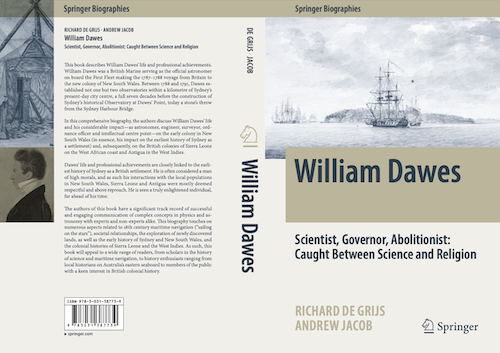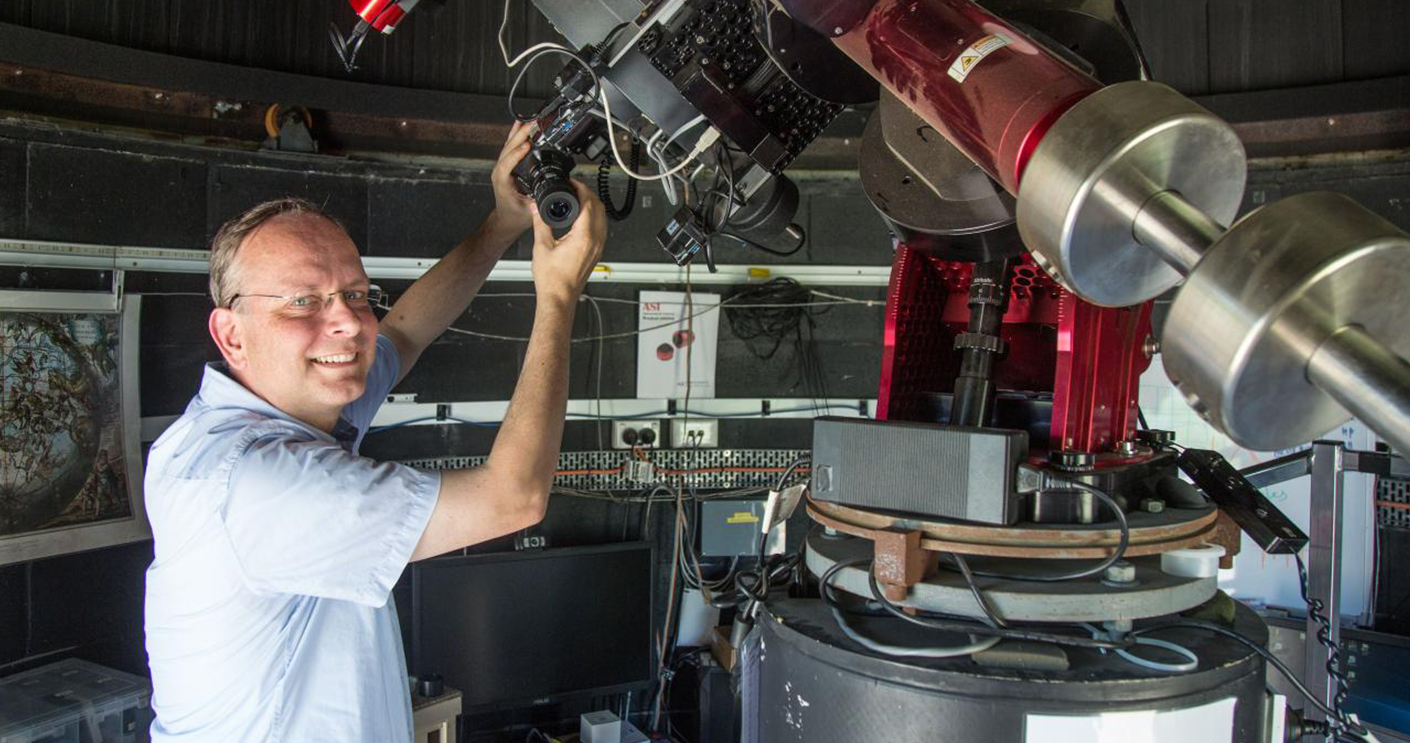Author, Professor Richard de Grijs
A new biography of Australian astronomer and First Fleet Second Lieutenant William Dawes promises to lift the veil on this little-known historical figure and his role as the colony’s first astronomer and jack of all trades.
William Dawes: Scientist, Governor, Abolitionist: Caught Between Science and Religion, by Macquarie University astronomer Professor Richard de Grijs and co-author Dr Andrew Jacob, curator of Sydney Observatory, is scheduled to be released on 4 December by Springer.

Book cover for William Dawes: Scientist, Governor, Abolitionist: Caught Between Science and Religion
Professor de Grijs has long been interested in the history of maritime navigation, its links to astronomy and the complex combination of calculations and astronomical observations that were essential for sailors working out their geographic location.
“When I moved to Australia six years ago, I started looking into maritime navigation in Australia’s early colonial days and saw mention of William Dawes, but I couldn’t find a book about him and there was very little about his astronomy pursuits,” says Professor de Grijs.
When Professor de Grijs asked Dr Jacob about Dawes, “He replied – ‘Ah, the mysterious William Dawes …’ and I became intrigued,” says Professor de Grijs.
The pair initially worked to find the location of Dawes’ original observatory and on discovering more about his intriguing and ultimately tragic life, decided to write his biography.
Best known for establishing Sydney’s first observatory, during his short time in the new colony, Dawes also served as an engineer, surveyor and ordnance officer, performing weather observations and taking part in early expeditions towards and into the Blue Mountains.
The book describes the important links between astronomy and navigation in the Age of Sail and the essential role of astronomers on early voyages of discovery.
Dr Nevil Maskelyne, Britain’s fifth Astronomer Royal, recommended Dawes to the First Fleet, tasking him with recording the return of a comet that had appeared in 1532 and 1661. It was an observation Dawes was ultimately unable to confirm.
Historic or scholarly literature documents many of Dawes’ clashes with authority; however Professor de Grijs says that, despite his prickly personality, Dawes had a strong social conscience and was way ahead of his time, describing him as brilliant and high performing, but troubled.
Mid-way through his journey to Botany Bay, Dawes quarreled with Captain Arthur Phillip and the pair never reconciled their differences. When Captain Phillip tasked him with raiding an Aboriginal settlement, it was the final insult for Dawes, who had been the first European to make a record of the Gadigal language.
“During his time in the first three years of the colony, when he established the Observatory, he had another altercation with Captain Phillip and was sent back to England at the end of his tour,” says Professor de Grijs.
Dawes’ departure marked the end of Sydney’s first observatory, the site of which Professor de Grijs has since identified. It took another 70 years to establish Sydney’s current observatory, in 1858.
Despite Dawes taking his astronomical instruments back with him to Britain, his astronomical career faltered, and he struggled as an unassigned marine on half-pay. Soon after, Dawes went to the Sierra Leone, in West Africa and found himself that colony’s Governor.
While in Africa, Dawes campaigned fiercely for the abolition of slavery, eventually moving to Antigua in the Caribbean where he was appointed Superintendant of Sunday Schools in the West Indies.
“There was very little information about him easily available about him, so we went through papers from the Board of Longitude, which are online at Cambridge University Library, the Colonial Office archives, Dawes’ Gadigal language notebooks, documents from the Church Missionary Society he worked for in Antigua, and an interesting, very lengthy document of his interrogation by the British Parliament’s House of Lords in relation to the slave trade,” says Professor de Grijs.
“Our aim was to shine a light on the mysterious Mr Dawes, a man who kept trying, but never quite succeeded, and who was ultimately a tragic character, way ahead of his time.”
Read about the search for Sydney’s first observatory on The Lighthouse or watch the video below.


 Back to homepage
Back to homepage
Hi, I was intrigued to read this review, as I researched the life of William Dawes and wrote a novel, PROMISED LANDS, about him. My book was published in 1996 and longlisted for the Women’s Fiction prize. https://www.hachette.com.au/jane-rogers/promised-lands
www.http://janerogers.info/promised_lands.html
He was a fascinating character, and it is good to know that at last there’s a biography. Through Cambridge University Library I found one letter, from him to his father; but most of my inf0rmation came from the excellent journals of other First Fleeters, in particular, that by William Tench.
That would be Watkin Tench.